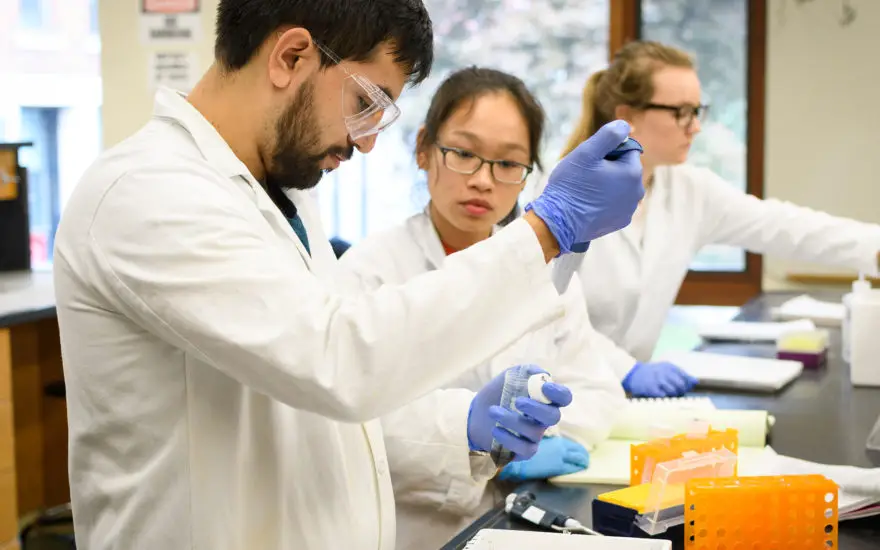As a college student, working a summer internship can add a key feature to future resumes. One viable option for those looking to find one is the Research Experience for Undergraduates program, often referred to as REU. Focused on STEM majors yet open to all, this federally funded program allows students to spend their summer at a different university working alongside graduate students and professors in their active research projects.
Although it may sound ideal, these programs are highly competitive — and it makes sense why. Once selected, the applicant is flown out to the university for free, and their housing is generally paid for by the program. Sometimes even meals are covered. Over the course of 10 weeks, in exchange for working diligently on your assigned research project, undergraduates get paid around $5,000.
Coming from someone who’s gone twice, there are some crucial tips to remember when applying, including a few especially useful practices that make any REU application more appealing. These tips, ranging from reading the lab’s official website to highlighting any special attributes you have, work to make your application stronger and giving you a better chance of securing your dream research position.
1. Before Applying
Before applying blindly, I recommend deciding what type of experience you want to get out of your internship. Each REU package is unique: some feature tons of interdisciplinary work, some include a lot of social interaction, some are in other countries. To figure out which experience you want, check out the National Science Foundation website, which includes information on all REUs available.
Coming from personal experience, you should make sure you actually want to do the work offered by each REU you apply to. Yes, summering in Southern California sounds like a dream, but does the actual project interest you? Honestly answering this question makes writing your personal statement much easier. It also ensures you won’t waste your summer doing something you don’t really love.
2. Personal Statement and Recommendations
Once you’ve found a good four or five REUs that appeal to you, you now have to prepare your application. To apply, you typically need to fill out a general demographic form, write a personal statement and get two to three recommendations.
For your personal statement, I recommend treating it like a cover letter and splitting it into two or three paragraphs. In the first section, consider briefly introducing yourself and talking about your short-term and long-term goals. If you’ve picked the right REUs, your goals should already be relevant. Then, mention relevant achievements and interests that demonstrate your capacity to do the work.
For example, I taught myself HTML and created my own blog last year. When I applied to my last REU in Florida, I made sure to include that because my project focused on developing a web application.
This section is also great for mentioning any unique hobbies or talents you have that can make you stand out and show that you have a personality. You may be skilled in what you do, but no one wants to work with a plank of wood. Show genuine enthusiasm and originality to differentiate yourself from other applicants.
In the second paragraph, you want to say which lab(s) within the REU you specifically want to work in. All of the participating labs are listed on the website. Each time I applied, I made sure I read about the labs, what were their research goals, who the professors and graduate students were within the lab and what projects they were working on. When writing the second paragraph, go into detail as to what project(s) you want to work on and why. Think in terms of the selection committee. If an applicant appears lazy and unoriginal, why would they want them to do research on their team?
Lastly, the worst thing that hurts any application is lousy recommendations. This is why it’s best to find professors and people in your environment who know you well and can vouch for your work ethic. Sometimes, you might not know anyone. That’s fine. Start talking to professors now and establish a relationship. Approach advisors from your major. When you need a recommendation, give these people a month’s notice, reminding them every few weeks. Other people have lives just like you, so be patient but diligent. Having super strong recommendations from people who know your work will boost your application. Without them, your validity as a potential researcher drops drastically.
3. Handling Acceptance and Rejection
From my experience, REUs let applicants know their status as late as April; if accepted, it tends to be earlier. If you are selected, consider this life-changing news. You are about to go to a new place dedicated to a subject you love. During this time, the program leader will likely send forms that need to be filled out, send you your flight times, explain where you will live and provide information on the program.
Once you arrive you might have one day of rest, but then you jump right into your new REU experience. It’s a beautiful achievement. I encourage you to work hard but also to play hard. Be open-minded! Talk to your REU cohort and tour the city you’re staying in. Whatever you do, be present in the experience. There are tons of people who would’ve loved to have your spot.
If you don’t get into any REUs this year, don’t worry. The first year I applied, I was rejected by all schools. There was even one school that baited me along but still ultimately rejected me. Some years there are just too many outstanding applicants. As always, it’s best to have a back-up plan in mind so you can still have a productive summer.
Another thing that I do with rejection emails is email back with something to the effect of, “Thanks for the opportunity. I hope you have a great summer.” The politeness goes both ways. You’ve detached yourself, accepting the rejection. The lab, who could only accept so many people, at least sees that you’re a good sport. In fact, my first REU in New York rejected me at first. Then, a week later, they accepted me after another person gave up their seat. I was at the top of their list. Like divine intervention, it was a truly mesmerizing experience that changed the course of my life in ways I’ll never understand.
So don’t beat yourself up. Look over your application and find any flaws. Next year, as long as you’re not a graduating senior, you can always try again.
4. Important Tips to Keep in Mind
— Save at least 10 percent of your stipend to pay taxes with next year.
— You most likely won’t get paid on day one. Have enough money to cover a month of groceries and bills.
— REUs have a 9-to-5 schedule, though both of mine were fairly lax as long as I completed my work on time.
— Don’t spend all your money on silly junk.
To end with, my REU experiences were so fun. During my first one, I got to visit New York City and Niagara Falls. I met incredibly intelligent and kind students. During my second REU in Florida, I met so many diverse students from outside the country. I ate alligator and went to the beach. In both of these experiences, I felt truly in control of my life.
I encourage anyone interested to visit the National Science Foundation and apply using the tips mentioned here. The REU experience will push you out of your comfort zone onto an escalator of intellectual rigor, career planning, self-esteem and confidence.
















